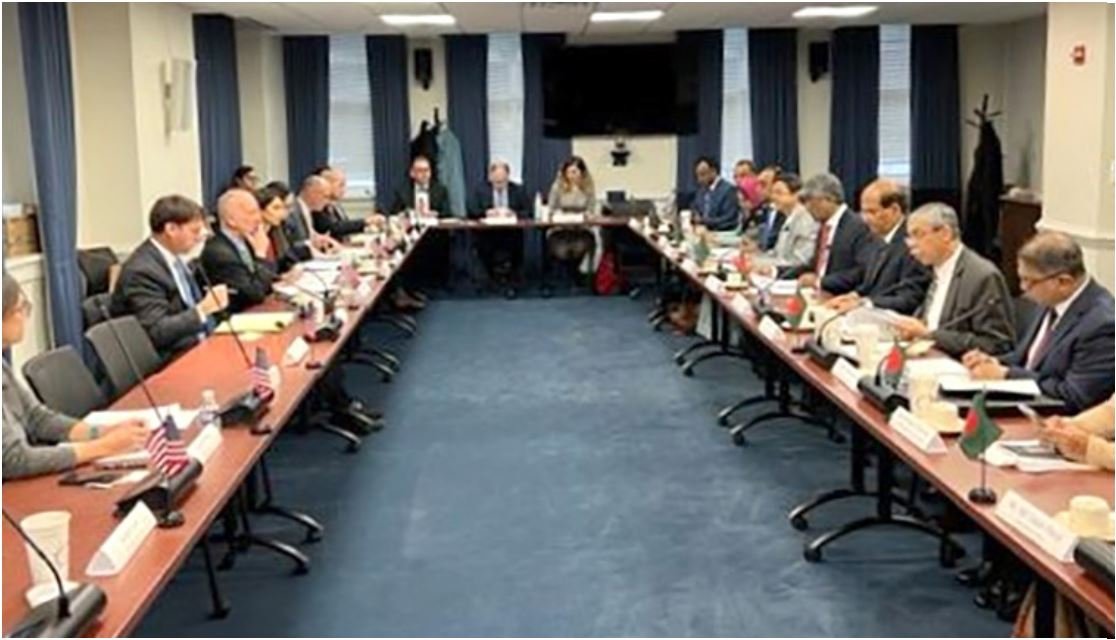The 6th Trade and Investment Cooperation Forum Agreement (TICFA) Council meeting between Bangladesh and the United States of America (USA) took place in Washington DC on December 6. Bangladesh has yet again demanded from the US the former’s much-needed reestablishment of the Generalised System of Preferences (GSP) from the latest TICFA meeting, which was co-chaired by Secretary of the Ministry of Commerce Tapan Kanti Ghosh and US Assistant Trade Representative for South and Central Asia Christopher Wilson. Both sides included officials from both the administrations’ commerce, labour, agriculture and other relevant departments.

YOU CAN ALSO READ: MALAYSIAN POLLS 2022 RACE BETWEEN PARTIES FOR PM’S MUSICAL CHAIR
The two countries during the meeting emphasised the importance of their strong economic and trade ties, which exceeded $10 billion in two-way trade in the year 2021. Both delegations affirmed their intention to enhance future bilateral trade and investment opportunities after the TICFA Council meeting through sustained engagement, and highlighted areas of technical work and expediting it. Bangladesh and the US discussed various issues affecting the bilateral trade relations, including ensuring labour rights, digital trade policy, market access for agricultural products, intellectual property rights protection, climate investment and policies affecting investment.

LABOUR RIGHTS:
Both sides reaffirmed the importance of Bangladesh’s efforts to reform labour laws and discussed the country’s interest in regaining beneficiary status under the US Generalized System of Preferences (GSP) programme. Meanwhile, consistent with the Biden administration’s focus on worker-centric trade policies, the United States has outlined its priorities in implementing and enforcing labour laws to rotect workers’ freedom and collective bargaining rights, and a safe and healthy workplace. The United States has emphasised greater alignment between Bangladesh’s domestic labour laws and international labour standards, particularly in export processing zones (EPZs) and special economic zones (SEZs), stressing the expansion of fundamental rights to freedom of association and collective bargaining. The US has expressed interest in collaborating with Bangladesh on new opportunities to promote labour rights, including combating forced labour in global supply chains.
DIGITAL TRADE:
The two countries also exchanged views on digital trade. Participants in the meeting discussed how digital policies can promote inclusive economic growth, innovation and investment. The United States expresses its support for the development of digital trade policies that support the participation of micro, small and medium enterprises (MSMEs) in the digital economy, increase trust for consumers, businesses, and workers, and facilitate secure cross-border data flows. The US states that new digital policies should be developed in an open and transparent manner with opportunities for open stakeholder engagement. Further, participants discussed ways to ensure that digital policies do not disadvantage foreign and domestic suppliers, disclose proprietary information or increase cybersecurity risks.
MARKET ACCESS FOR AGRICULTURAL PRODUCTS:
Bangladesh and the US have made progress on reducing market access barriers for some agricultural products and discussed ways to facilitate bilateral trade in food and agricultural products through the use of science-based policies that ensure trade in safe food and agricultural products. Both sides agreed to consider expert-level engagement on market access for agricultural products in the future.
INTELLECTUAL PROPERTY:
Both countries have highlighted the importance of protecting and enforcing intellectual property (IP) to encourage innovation and promote trade and investment. In this regard, participants welcomed the opportunity for additional expert-level engagement between the US and Bangladesh on patent rules and cross-border enforcement. The US has also reiterated its interest in engaging with Bangladesh on upcoming IP reforms.
CLIMATE INVESTMENT:
The United States recognises the critical role of investment in supporting Bangladesh’s development goals as it moves up to middle-income status. The TICFA participants exchanged views on the importance of predictability and transparency for both Bangladeshi and foreign companies operating in Bangladesh. They also described the importance of increasing climate investment.
To conclude, the participants decided that the next meeting of the US-Bangladesh TICFA Council will tentatively be held in Bangladesh in 2023 and that regular contact between the officials will be maintained in the lead-up to that meeting. The United States and Bangladesh have formally engaged in meetings on trade issues since the US-Bangladesh TICFA entered into force in 2013. It is to be noted that the last TICFA meeting was held in Dhaka on March 5, 2020.


